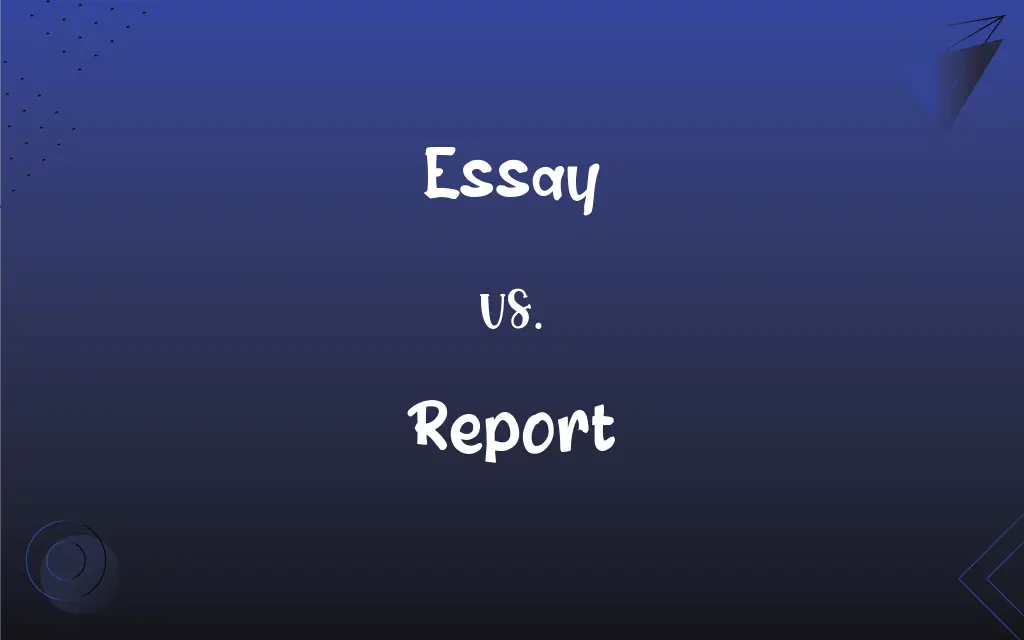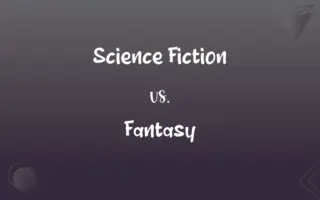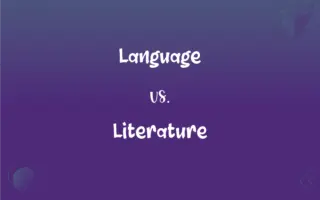Essay vs. Report: What's the Difference?
Edited by Janet White || By Harlon Moss || Updated on October 25, 2023
An essay presents arguments and insights on a topic, while a report provides structured information or findings on a specific subject.

Key Differences
Essays and reports are two common types of academic writing, each with its own purpose. An essay is typically a piece of writing that presents arguments, insights, or reflections on a specific topic or question. It is subjective and seeks to persuade, inform, or enlighten the reader. Reports, on the other hand, are structured documents that provide information, findings, or results on a particular subject, often based on research or investigation.
While both essays and reports are used for academic and professional purposes, their structures differ significantly. An essay generally follows a continuous narrative, with an introduction, body paragraphs, and a conclusion. The flow in an essay is crucial as it aims to take the reader on a journey through the writer's thoughts. Reports, conversely, often follow a more rigid structure, with sections like introduction, methodology, findings, and conclusion. They might also include tables, figures, and appendices.
In terms of tone and style, essays are often more personal, allowing for the writer's voice and opinion to shine through. They require critical thinking, evaluation, and a clear line of argument. Reports are more factual and objective. They focus on presenting data, evidence, and facts without the inclusion of personal opinions or emotions.
The audience and purpose of essays and reports can also vary. Essays are generally written for a broad audience and aim to engage the reader, provoke thought, or persuade. Reports are usually aimed at a specific audience, such as stakeholders in a company or members of a research committee, and have a clear objective like informing about findings or recommending actions.
Comparison Chart
Purpose
Argue, inform, or reflect
Present information or findings
ADVERTISEMENT
Structure
Continuous narrative
Sectioned and may have appendices
Tone and Style
Personal, subjective
Objective, factual
Inclusion of Opinion
Often present
Typically absent
Audience
Broad
Specific
Essay and Report Definitions
Essay
A literary composition to express an idea or argument.
The student's essay brilliantly argued the merits of renewable energy.
ADVERTISEMENT
Report
A detailed account of a specific matter.
The scientist submitted a report on his findings.
Essay
An attempt or effort to do something.
He made an essay at solving the complex equation.
Report
A spoken or written description of an event or situation.
The journalist's report covered the recent protests in the city.
Essay
A written piece offering a personal viewpoint.
Her essay provided a unique perspective on urban development.
Report
An official account of facts or events.
The police officer filed a report about the incident.
Essay
A composition evaluating or analyzing a topic.
The philosophy essay delved deep into existential concepts.
Report
A statement made to a higher authority.
The employee's report highlighted the project's successes.
Essay
A short piece of writing on a particular subject.
Her essay on climate change received much acclaim.
Report
An account given of a particular matter after investigation or research.
The research team produced a comprehensive report on the effects of pollution.
Essay
A short literary composition on a single subject, usually presenting the personal view of the author.
Report
A formal account of the proceedings or transactions of a group
A company's annual report.
FAQs
What is the primary aim of an essay?
An essay aims to argue, inform, or reflect on a topic.
Are reports subjective?
Reports are generally objective and factual.
How is a report typically structured?
A report follows a structured format with sections like introduction, findings, and conclusion.
Can essays contain personal opinions?
Yes, essays often contain personal opinions and reflections.
Is a report a detailed account?
Yes, a report provides a detailed account of a specific matter.
Are essays longer than reports?
Not necessarily. Length varies based on the topic and purpose.
What's the tone of a report?
Reports have an objective and factual tone.
Are essays always formal?
No, essays can be both formal and informal, depending on the context.
Should essays be persuasive?
Essays often aim to persuade, inform, or enlighten the reader.
Can an essay be a literary composition?
Yes, essays can be literary compositions expressing ideas or arguments.
Can essays explore philosophical concepts?
Yes, essays can delve into various topics, including philosophy.
Do essays have a rigid structure?
Essays follow a more fluid structure with an introduction, body, and conclusion.
Can reports include tables and figures?
Yes, reports often contain tables, figures, and appendices.
Who is the typical audience for an essay?
Essays are written for a broad audience.
What's the main objective of a report?
To present information, findings, or results on a specific subject.
Do reports always result from research?
Often, but not always. Reports can be accounts of events, situations, or findings.
Who typically reads a report?
A specific audience, such as stakeholders or committee members.
Can a report be spoken?
Yes, reports can be both written and spoken.
Is critical thinking essential in essay writing?
Yes, essays require critical thinking and evaluation.
Do reports make recommendations?
Often, especially if they're based on research or investigations.
About Author
Written by
Harlon MossHarlon is a seasoned quality moderator and accomplished content writer for Difference Wiki. An alumnus of the prestigious University of California, he earned his degree in Computer Science. Leveraging his academic background, Harlon brings a meticulous and informed perspective to his work, ensuring content accuracy and excellence.
Edited by
Janet WhiteJanet White has been an esteemed writer and blogger for Difference Wiki. Holding a Master's degree in Science and Medical Journalism from the prestigious Boston University, she has consistently demonstrated her expertise and passion for her field. When she's not immersed in her work, Janet relishes her time exercising, delving into a good book, and cherishing moments with friends and family.































































